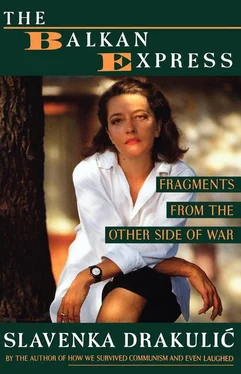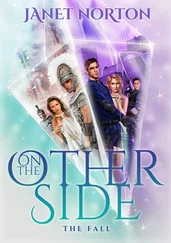Ivan is talking and I am listening and thinking of his mother. He says that at one point she heard that both he and his younger brother had been killed and she bought black clothes for mourning with her last penny. When they called to tell her they were alive, she could not believe it until she saw them with her own eyes. She did not even recognize their voices; for her they were already dead. Then he talks about his room. It is high up in the attic, he laid and varnished the floorboards himself, he painted the walls. When he finally moved in, the room smelled of turpentine, linseed oil, varnish and wall paint for a long time. I ask him what colour he painted the walls. I painted the walls blue, the room was blue and all mine, mine only. Do you like blue? he asks me, as if this is important because it will tell him something about me. I describe the blue of the window shutters on a house in Istria, the turquoise patches on a facade that has peeled off long ago but the colour still shines through. And the blue paint used for boats and fences; he knows about these things, he’s keen on them and for an instant it seems that our two pictures of the world, his and mine, mesh and engage in a single point of blueness. But then suddenly, as if interrupting something before it goes too far, Ivan says: blue is for me the colour of war. Only then do I realize that he has been talking about the house and his room in the past tense. He has been describing a picture of a room that exists only in his memory, like that special shade of blue on its walls that has not paled only in his mind’s eye. And while he is talking, below his tender boyish face there emerges the face of a grown-up man for whom neither his own nor anyone else’s life can have the same meaning as before. I watch him grow old before my eyes and he knows it, but that is his true face, the face of the war.
I feel now that we have both crossed the threshold of nausea. I don’t have to ask him anything else, but I may, I have his silent permission. Now he is talking about the first time he was sick and how he killed a man. What corpses look like and finally, how he cried. He talks just as my son might talk, if I had a son, if he’d gone to war and if he’d stayed alive.
ZAGREB MARCH 1992
— Why did you volunteer for the Croatian Guards?
— I don’t know, something in me made me do it…
— Because others were volunteering, too?
— It’s not that so much… there were only a few of us at the beginning. But something drove me to it. I kept thinking I must join up, I must.
— How did you explain this to your mother?
— It was really bad for her, she thought everybody who went to fight would be killed.
— Was there fighting going on in Vukovar by then?
— Yes, my fifth day in I was already sent to mop up.
— What does that mean, ‘to mop up’?
— It means you get the Chetniks and take the weapons they have stashed away.
— How did you know who had hidden weapons?
— Well, some of their own people told us, those who were scared of us, because they heard we were going to butcher them.
— And what does ‘mopping up’ look like?
— We came to these houses, but they already knew we were coming. When we jumped off the truck, snipers started shooting at us. We took shelter in some houses nearby and started to shoot back, and a group of us managed to sneak up from behind, from the back.
— Who was in those houses they shot at you from, who are the Chetniks?
— The Serbs who lived there and the imported ones, the ones sent from Serbia. The reservists.
— Was this your first action?
— Yes, it was in the middle of July 1991.
— What was your job?
— I had to cover the others because the commander wouldn’t let me fight, I was the youngest. What you do is you take a position and keep a look-out.
— You had a gun? You knew how to use it?
— An automatic. I learned to shoot way back, in April. The older guys taught me.
— Where did they get the weapons from?
— Bought them.
— So people had already been preparing for war?
— Yes, for quite some time. In Vukovar the Croats were getting armed. The Serbs already had weapons, they would walk around and boast about it.
— And how did you feel going into your first action?
— Can’t say I was totally cool about it.
— Fear?
— It’s not exactly fear, it’s like… you’re afraid you’re going to get killed. That’s all you can think about.
— What kind of feeling is it, then, if you say it’s not fear, how do you tell it apart from fear?
— I think fear’s got more to do with panic, and this is… like, you’re afraid of dying, why you, what if now… and you can’t get it out of your head…
— Let’s go back to your first action.
— There was only one house with Chetniks in it, the rest of them ran away into the wood across the Vuka river, into Brsadin. There were perhaps two or three of them in that house and we wanted to make them surrender. We went into the house but couldn’t find them. Then we saw this narrow door leading to the basement, one of our guys was about to open the door when a bullet pierced his hand, it came from down below. You couldn’t get down there, the staircase was too narrow. We asked them to come out, we told them nothing would happen to them, they’d be tried in court. And they kept yelling from below, you’re Ustashas, you’ll slaughter us. Then another of our guys tried to get down there and got shot in the shoulder. Then his friend got really mad, went behind the house, opened a small basement window and threw a bomb inside. And then, when we went to the basement, that’s the first time I saw it…
— What did you see?
— People blown up and torn to pieces. One or two men, it couldn’t have been more than that. The basement was small, you couldn’t really tell how many of them were there. They were mincemeat, all that was left of them was blood stains on the wall. Everything was spattered with blood. I went out. I didn’t really care because I’d had no part in it, it wasn’t me that…
— But when you see that…
— But it’s not… the feeling isn’t the same.
— Later you got used to seeing things like that?
— I remember one Saturday, it was raining and we were resting, like. And there was this air raid. They mostly machined-gunned from the planes, seven of our guys were wounded. That day was the worst for me. I saw a shell fall on a car and it burst into flames. There were people inside that car.
— Were they civilians?
— Civilians. A neighbour of mine was driving, he used to live a hundred yards from my house. His brother was sitting in the back. The fire had already caught him and he was all scorched, we tried to pry the doors open but he was already dead. For the first time in my life I saw skin melt off a man, that was… everything is in flames, the car is burning, the man is sitting inside with his eyes wide open, and there’s nothing anyone can do. His head just sinks lower and his face melts. A bullet wounds you or kills you, but this, it’s like the movies, like setting a wax doll on fire. The flesh on his arms burned off to the bones.
— They say that corpses were lying in the streets of Vukovar.
— I first saw a heap of corpses when someone came and said people couldn’t sleep because of the stench of dead bodies in the cornfield. Because they left their dead behind, even the wounded. They never came back to pick them up.
— Who came to tell you about the corpses?
— The guys who held the position in the houses at the edge of the city, near the cornfields. It was summer and very hot, they said it stank like hell. Dogs were coming, there was a danger of diseases spreading. Something had to be done, the place had to be cleaned up. We loaded a truck full of corpses.
Читать дальше












